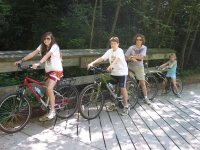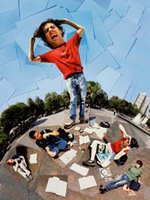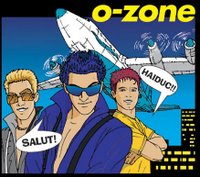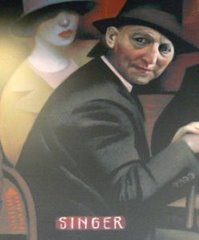 It wouldn't be Thanksgiving without it. Alice's RestaurantBy Arlo Guthrie
It wouldn't be Thanksgiving without it. Alice's RestaurantBy Arlo Guthrie
This song is called Alice's Restaurant, and it's about Alice, and the
restaurant, but Alice's Restaurant is not the name of the restaurant,
that's just the name of the song, and that's why I called the song Alice's
Restaurant.
You can get anything you want at Alice's Restaurant
You can get anything you want at Alice's Restaurant
Walk right in it's around the back
Just a half a mile from the railroad track
You can get anything you want at Alice's Restaurant
Now it all started two Thanksgivings ago, was on - two years ago on
Thanksgiving, when my friend and I went up to visit Alice at the
restaurant, but Alice doesn't live in the restaurant, she lives in the
church nearby the restaurant, in the bell-tower, with her husband Ray and
Fasha the dog. And livin' in the bell tower like that, they got a lot of
room downstairs where the pews used to be in. Havin' all that room,
seein' as how they took out all the pews, they decided that they didn't
have to take out their garbage for a long time.
We got up there, we found all the garbage in there, and we decided it'd be
a friendly gesture for us to take the garbage down to the city dump. So
we took the half a ton of garbage, put it in the back of a red VW
microbus, took shovels and rakes and implements of destruction and headed
on toward the city dump.
Well we got there and there was a big sign and a chain across across the
dump saying, "Closed on Thanksgiving." And we had never heard of a dump
closed on Thanksgiving before, and with tears in our eyes we drove off
into the sunset looking for another place to put the garbage.
We didn't find one. Until we came to a side road, and off the side of the
side road there was another fifteen foot cliff and at the bottom of the
cliff there was another pile of garbage. And we decided that one big pile
is better than two little piles, and rather than bring that one up we
decided to throw our's down.
That's what we did, and drove back to the church, had a thanksgiving
dinner that couldn't be beat, went to sleep and didn't get up until the
next morning, when we got a phone call from officer Obie. He said, "Kid,
we found your name on an envelope at the bottom of a half a ton of
garbage, and just wanted to know if you had any information about it." And
I said, "Yes, sir, Officer Obie, I cannot tell a lie, I put that envelope
under that garbage."
After speaking to Obie for about fourty-five minutes on the telephone we
finally arrived at the truth of the matter and said that we had to go down
and pick up the garbage, and also had to go down and speak to him at the
police officer's station. So we got in the red VW microbus with the
shovels and rakes and implements of destruction and headed on toward the
police officer's station.
Now friends, there was only one or two things that Obie coulda done at
the police station, and the first was he could have given us a medal for
being so brave and honest on the telephone, which wasn't very likely, and
we didn't expect it, and the other thing was he could have bawled us out
and told us never to be see driving garbage around the vicinity again,
which is what we expected, but when we got to the police officer's station
there was a third possibility that we hadn't even counted upon, and we was
both immediately arrested. Handcuffed. And I said "Obie, I don't think I
can pick up the garbage with these handcuffs on." He said, "Shut up, kid.
Get in the back of the patrol car."
And that's what we did, sat in the back of the patrol car and drove to the
quote Scene of the Crime unquote. I want tell you about the town of
Stockbridge, Massachusets, where this happened here, they got three stop
signs, two police officers, and one police car, but when we got to the
Scene of the Crime there was five police officers and three police cars,
being the biggest crime of the last fifty years, and everybody wanted to
get in the newspaper story about it. And they was using up all kinds of
cop equipment that they had hanging around the police officer's station.
They was taking plaster tire tracks, foot prints, dog smelling prints, and
they took twenty seven eight-by-ten colour glossy photographs with circles
and arrows and a paragraph on the back of each one explaining what each
one was to be used as evidence against us. Took pictures of the approach,
the getaway, the northwest corner the southwest corner and that's not to
mention the aerial photography.
After the ordeal, we went back to the jail. Obie said he was going to put
us in the cell. Said, "Kid, I'm going to put you in the cell, I want your
wallet and your belt." And I said, "Obie, I can understand you wanting my
wallet so I don't have any money to spend in the cell, but what do you
want my belt for?" And he said, "Kid, we don't want any hangings." I
said, "Obie, did you think I was going to hang myself for littering?"
Obie said he was making sure, and friends Obie was, cause he took out the
toilet seat so I couldn't hit myself over the head and drown, and he took
out the toilet paper so I couldn't bend the bars roll out the - roll the
toilet paper out the window, slide down the roll and have an escape. Obie
was making sure, and it was about four or five hours later that Alice
(remember Alice? It's a song about Alice), Alice came by and with a few
nasty words to Obie on the side, bailed us out of jail, and we went back
to the church, had a another thanksgiving dinner that couldn't be beat,
and didn't get up until the next morning, when we all had to go to court.
We walked in, sat down, Obie came in with the twenty seven eight-by-ten
colour glossy pictures with circles and arrows and a paragraph on the back
of each one, sat down. Man came in said, "All rise." We all stood up,
and Obie stood up with the twenty seven eight-by-ten colour glossy
pictures, and the judge walked in sat down with a seeing eye dog, and he
sat down, we sat down. Obie looked at the seeing eye dog, and then at the
twenty seven eight-by-ten colour glossy pictures with circles and arrows
and a paragraph on the back of each one, and looked at the seeing eye dog.
And then at twenty seven eight-by-ten colour glossy pictures with circles
and arrows and a paragraph on the back of each one and began to cry,
'cause Obie came to the realization that it was a typical case of American
blind justice, and there wasn't nothing he could do about it, and the
judge wasn't going to look at the twenty seven eight-by-ten colour glossy
pictures with the circles and arrows and a paragraph on the back of each
one explaining what each one was to be used as evidence against us. And
we was fined $50 and had to pick up the garbage in the snow, but thats not
what I came to tell you about.
Came to talk about the draft.
They got a building down New York City, it's called Whitehall Street,
where you walk in, you get injected, inspected, detected, infected,
neglected and selected. I went down to get my physical examination one
day, and I walked in, I sat down, got good and drunk the night before, so
I looked and felt my best when I went in that morning. `Cause I wanted to
look like the all-American kid from New York City, man I wanted, I wanted
to feel like the all-, I wanted to be the all American kid from New York,
and I walked in, sat down, I was hung down, brung down, hung up, and all
kinds o' mean nasty ugly things. And I waked in and sat down and they gave
me a piece of paper, said, "Kid, see the phsychiatrist, room 604."
And I went up there, I said, "Shrink, I want to kill. I mean, I wanna, I
wanna kill. Kill. I wanna, I wanna see, I wanna see blood and gore and
guts and veins in my teeth. Eat dead burnt bodies. I mean kill, Kill,
KILL, KILL." And I started jumpin up and down yelling, "KILL, KILL," and
he started jumpin up and down with me and we was both jumping up and down
yelling, "KILL, KILL." And the sargent came over, pinned a medal on me,
sent me down the hall, said, "You're our boy."
Didn't feel too good about it.
Proceeded on down the hall gettin more injections, inspections,
detections, neglections and all kinds of stuff that they was doin' to me
at the thing there, and I was there for two hours, three hours, four
hours, I was there for a long time going through all kinds of mean nasty
ugly things and I was just having a tough time there, and they was
inspecting, injecting every single part of me, and they was leaving no
part untouched. Proceeded through, and when I finally came to the see the
last man, I walked in, walked in sat down after a whole big thing there,
and I walked up and said, "What do you want?" He said, "Kid, we only got
one question. Have you ever been arrested?"
And I proceeded to tell him the story of the Alice's Restaurant Massacre,
with full orchestration and five part harmony and stuff like that and all
the phenome... - and he stopped me right there and said, "Kid, did you ever
go to court?"
And I proceeded to tell him the story of the twenty seven eight-by-ten
colour glossy pictures with the circles and arrows and the paragraph on
the back of each one, and he stopped me right there and said, "Kid, I want
you to go and sit down on that bench that says Group W .... NOW kid!!"
And I, I walked over to the, to the bench there, and there is, Group W's
where they put you if you may not be moral enough to join the army after
committing your special crime, and there was all kinds of mean nasty ugly
looking people on the bench there. Mother rapers. Father stabbers. Father
rapers! Father rapers sitting right there on the bench next to me! And
they was mean and nasty and ugly and horrible crime-type guys sitting on the
bench next to me. And the meanest, ugliest, nastiest one, the meanest
father raper of them all, was coming over to me and he was mean 'n' ugly
'n' nasty 'n' horrible and all kind of things and he sat down next to me
and said, "Kid, whad'ya get?" I said, "I didn't get nothing, I had to pay
$50 and pick up the garbage." He said, "What were you arrested for, kid?"
And I said, "Littering." And they all moved away from me on the bench
there, and the hairy eyeball and all kinds of mean nasty things, till I
said, "And creating a nuisance." And they all came back, shook my hand,
and we had a great time on the bench, talkin about crime, mother stabbing,
father raping, all kinds of groovy things that we was talking about on the
bench. And everything was fine, we was smoking cigarettes and all kinds of
things, until the Sargeant came over, had some paper in his hand, held it
up and said.
"Kids, this-piece-of-paper's-got-47-words-37-sentences-58-words-we-wanna-
know-details-of-the-crime-time-of-the-crime-and-any-other-kind-of-thing-
you-gotta-say-pertaining-to-and-about-the-crime-I-want-to-know-arresting-
officer's-name-and-any-other-kind-of-thing-you-gotta-say", and talked for
forty-five minutes and nobody understood a word that he said, but we had
fun filling out the forms and playing with the pencils on the bench there,
and I filled out the massacre with the four part harmony, and wrote it
down there, just like it was, and everything was fine and I put down the
pencil, and I turned over the piece of paper, and there, there on the
other side, in the middle of the other side, away from everything else on
the other side, in parentheses, capital letters, quotated, read the
following words:
("KID, HAVE YOU REHABILITATED YOURSELF?")
I went over to the sargent, said, "Sargeant, you got a lot a damn gall to
ask me if I've rehabilitated myself, I mean, I mean, I mean that just, I'm
sittin' here on the bench, I mean I'm sittin here on the Group W bench
'cause you want to know if I'm moral enough join the army, burn women,
kids, houses and villages after bein' a litterbug." He looked at me and
said, "Kid, we don't like your kind, and we're gonna send you fingerprints
off to Washington."
And friends, somewhere in Washington enshrined in some little folder, is a
study in black and white of my fingerprints. And the only reason I'm
singing you this song now is cause you may know somebody in a similar
situation, or you may be in a similar situation, and if your in a
situation like that there's only one thing you can do and that's walk into
the shrink wherever you are ,just walk in say "Shrink, You can get
anything you want, at Alice's restaurant.". And walk out. You know, if
one person, just one person does it they may think he's really sick and
they won't take him. And if two people, two people do it, in harmony,
they may think they're both faggots and they won't take either of them.
And three people do it, three, can you imagine, three people walking in
singin a bar of Alice's Restaurant and walking out. They may think it's an
organization. And can you, can you imagine fifty people a day,I said
fifty people a day walking in singin a bar of Alice's Restaurant and
walking out. And friends they may thinks it's a movement.
And that's what it is , the Alice's Restaurant Anti-Massacre Movement, and
all you got to do to join is sing it the next time it come's around on the
guitar.
With feeling. So we'll wait for it to come around on the guitar, here and
sing it when it does. Here it comes.
You can get anything you want, at Alice's Restaurant
You can get anything you want, at Alice's Restaurant
Walk right in it's around the back
Just a half a mile from the railroad track
You can get anything you want, at Alice's Restaurant
That was horrible. If you want to end war and stuff you got to sing loud.
I've been singing this song now for twenty five minutes. I could sing it
for another twenty five minutes. I'm not proud... or tired.
So we'll wait till it comes around again, and this time with four part
harmony and feeling.
We're just waitin' for it to come around is what we're doing.
All right now.
You can get anything you want, at Alice's Restaurant
Excepting Alice
You can get anything you want, at Alice's Restaurant
Walk right in it's around the back
Just a half a mile from the railroad track
You can get anything you want, at Alice's Restaurant
Da da da da da da da dum
At Alice's Restaurant
©1966,1967 (Renewed) by Appleseed Music Inc. All Rights Reserved.






















